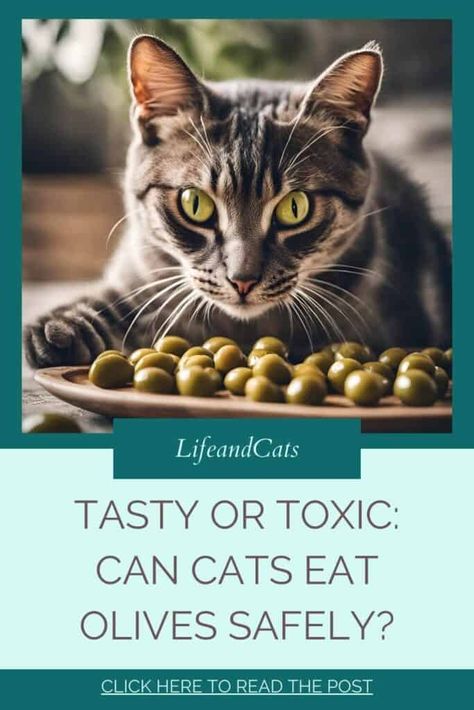Can Cats Eat Olive Oil?
When it comes to feeding our feline friends, cat owners often ponder about the safety and benefits of various human foods. One such commonly discussed item is olive oil. While olive oil is well-known for its health benefits for humans, the question arises: can cats eat olive oil? In this article, we will delve deep into this topic, exploring the potential benefits and risks, and provide guidance on how to safely incorporate olive oil into your cat’s diet if deemed appropriate. Can Cats Eat Olive Oil?
Introduction: Can Cats Eat Olive Oil?
As cat owners, we are always looking for ways to enhance our pets’ health and well-being. Olive oil, with its numerous health benefits for humans, often makes us wonder if it can be equally beneficial for our feline companions. However, before adding any new food to your cat’s diet, it’s essential to understand its potential effects. So, can cats eat olive oil? Let’s explore this question in detail. Can Cats Eat Olive Oil?
The Nutritional Profile of Olive Oil

Before we determine whether cats can eat olive oil, it’s important to understand what olive oil consists of. Olive oil is rich in monounsaturated fats, primarily polemic acid, and contains a modest amount of vitamins E and K. Additionally, it is packed with antioxidants and anti-inflammatory compounds. These components contribute to olive oil’s reputation as a heart-healthy and anti-inflammatory food for humans.
Potential Benefits of Olive Oil for Cats
Can cats eat olive oil and benefit from its properties? Some veterinarians and pet owners believe that olive oil can provide certain health benefits for cats when given in moderation. Here are some potential advantages:
1. Promotes a Healthy Coat and Skin
Olive oil is known for its moisturising properties. When cats consume olive oil, it may help in maintaining a healthy and shiny coat. The omega-3 fatty acids present in olive oil can aid in reducing dry and flaky skin, keeping your cat’s fur soft and smooth.
2. Supports Digestive Health
Can cats eat olive oil to improve their digestion? Yes, olive oil can act as a mild laxative, helping to prevent constipation in cats. A small amount of olive oil added to their diet can ease bowel movements and ensure smooth digestion. However, it’s crucial to use olive oil sparingly to avoid any adverse effects.
3. Boosts Immune System
Olive oil’s antioxidant properties can help in boosting your cat’s immune system. The presence of vitamins E and K, along with other antioxidants, can protect your cat’s cells from oxidative damage and support overall health.
4. Anti-inflammatory Benefits
The anti-inflammatory properties of olive oil can be beneficial for cats suffering from arthritis or other inflammatory conditions. Incorporating olive oil into their diet might help reduce inflammation and provide relief from pain and discomfort.
Risks and Precautions: Can Cats Eat Olive Oil Safely?
While olive oil can offer several benefits, it’s essential to consider the potential risks and precautions. Can cats eat olive oil without any adverse effects? Here are some points to keep in mind:

1. High-Calorie Content
Olive oil is calorie-dense, and excessive consumption can lead to weight gain and obesity in cats. Obesity can further contribute to various health issues, including diabetes and joint problems. Therefore, it’s crucial to monitor the quantity of olive oil given to your cat and ensure it does not exceed the recommended amount. Can Cats Eat Olive Oil?
2. Digestive Upset
Can cats eat olive oil without experiencing digestive upset? While olive oil can aid in digestion, too much of it can cause gastrointestinal distress, leading to diarrhoea or vomiting. It’s important to introduce olive oil gradually and observe your cat’s response to avoid any digestive issues.
3. Allergic Reactions
Some cats might be allergic to olive oil. If you notice any signs of an allergic reaction, such as itching, swelling, or difficulty breathing, discontinue the use of olive oil immediately and consult your veterinarian. Can Cats Eat Olive Oil?
4. Interference with Medications
Olive oil can potentially interfere with certain medications your cat might be taking. If your cat is on any prescribed medication, it’s advisable to consult your veterinarian before adding olive oil to their diet to ensure there are no interactions. Can Cats Eat Olive Oil?
How to Introduce Olive Oil to Your Cat’s Diet
If you’ve determined that your cat can eat olive oil, it’s important to introduce it gradually and in moderation. Here are some steps to follow:
1. Start with a Small Amount
Begin by adding a small amount of olive oil to your cat’s food. A quarter to half a teaspoon is sufficient for a start. Observe your cat’s reaction and monitor for any adverse effects.
2. Mix with Regular Food
Mix the olive oil thoroughly with your cat’s regular food to ensure even distribution. This will help your cat consume the oil without noticing a significant change in taste or texture.
3. Monitor and Adjust
Can cats eat olive oil regularly? While it can be included as part of their diet, it should not be given daily. Monitor your cat’s health and adjust the amount and frequency of olive oil based on their response and overall well-being.
Alternative Oils for Cats
While olive oil can be beneficial, there are other oils that might be suitable for cats as well. Here are a few alternatives to consider:
1. Fish Oil
Fish oil, rich in omega-3 fatty acids, is known for its numerous health benefits. It can promote a healthy coat, support joint health, and boost the immune system. However, like olive oil, it should be given in moderation.
2. Coconut Oil
Coconut oil has gained popularity for its potential health benefits. It can help improve skin and coat condition, aid in digestion, and provide a quick source of energy. As with any oil, it should be introduced gradually and given in small amounts.
3. Flax seed Oil
Flax seed oil is another option that contains omega-3 fatty acids. It can contribute to a healthy coat and support overall health. Ensure you choose a high-quality, cold-pressed flax seed oil for your cat.
Conclusion: Can Cats Eat Olive Oil?
In conclusion, can cats eat olive oil? Yes, cats can eat olive oil in moderation, and it can provide several health benefits. However, it’s important to introduce it gradually, monitor your cat’s response, and ensure it does not interfere with their overall diet and health. Always consult your veterinarian before making any significant changes to your cat’s diet.
FAQs: Can Cats Eat Olive Oil

Welcome to Hypocats.com! I’m Khawar Akhtar, a passionate writer dedicated to all things feline. With a deep love for cats and a keen interest in their health, diet, and training, I strive to provide cat owners with valuable insights and practical advice to enhance their furry friends’ well-being. My goal is to share my expertise and enthusiasm for our whiskered companions, helping them lead happier, healthier lives. When I’m not writing, you’ll find me spending quality time with my Russian Blue cat, enjoying the simple joys that come with being a cat lover. Thank you for visiting Hypocats.com—I hope you find the information here as helpful and inspiring as I do!



Leave a Reply